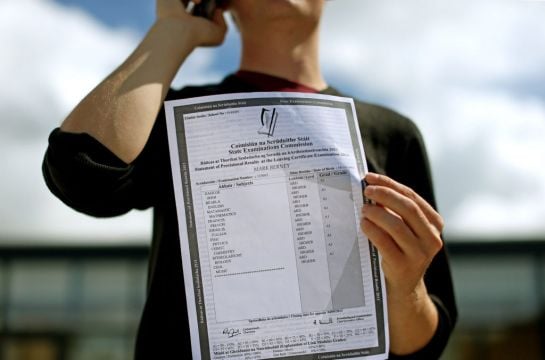The dreaded time of year for students around the country has rolled around once again, joined by the traditional bout of good weather that lets us all know the Leaving Certificate exams are about the get underway.
After last year's cancellation caused by Covid-19, this year's Leaving Certs were given the option to choose between 'SEC accredited grades' and sitting the written exams.
Beginning on Wednesday, June 9th, the exams will run until June 29th. Here's everything you need to know about this year's Leaving Cert...
What are SEC accredited grades?
Basically, a new name for calculated grades, accredited by the State Examination Commission (SEC).
Brought in last year due to the cancellation of the written exams, calculated grades see students receive a grade from their subject teacher based on their performance during the school year, "taking cognisance of likely performance in all aspects of an examination including, where relevant, oral, practical and coursework components and tasks" according to the Department of Education.
These results are then standardised at a national level, attempting to decrease grade inflation.
Despite this process of standardisation being used last year, the 2020 results were higher across the board with a 4.4 per cent improvement in grades being noted across all subjects. This had a knock-on effect for CAO points, which are used to award third-level places, and for this reason, the process has faced criticism.
What's the alternative?
This year's students can choose to take the SEC accredited grades, sit the written exams, or both. If they choose both, they will be automatically awarded the higher result of the two.
Students can also decide if they want to take the exams on a subject-by-subject basis, meaning they can choose to sit the written papers in some subjects while taking accredited grades for others.
In line with current Covid-19 rules, social distancing will need to be maintained at all exam centres, and students will be required to wear face coverings while taking the papers.
Will the written exams be similar to other years?
The timetable for the written exams is largely the same as previous years with core subjects English, Maths and Irish being held across the first five days.
A number of adjustments have been made to the papers however, "to take account of the disrupted learning experienced by students during the 2019/20 school year", including increased choice of questions and the removal of some compulsory questions.
When will results be issued?
The Department of Education confirmed last week that results will be issued to students on Friday, September 3rd.
This is much later than previous years, with results normally issued in mid-August.
This has raised concerns for students wishing to go on to further and higher education as CAO offers will only be able to be offered after this date. Round 1 CAO offers will now be made on September 7th.
But haven't colleges usually started back by then?
Yes - further and higher institutes normally start the academic year in early September, and orientation for new students is usually held the week before classes begin.
This means most colleges have had to go back to the drawing board with their plans to welcome new first years, likely having to push back orientation and the start of classes a little bit.
As with previous years, subsequent rounds of CAO offers will also continue until all places have been filled. This often sees students offered places in courses which were higher up their preference list when the academic year has already started, but colleges often offer additional supports to students in these situations to make up for anything they may have missed.
The quick turn around between results and the start of the academic year could also prove stressful for those looking for accommodation if they end up being offered a place in a college they had not been planning for. However, institutes have assured they are taking measures to hold accommodation for new students and the majority of colleges have dedicated accommodation offices to help students find somewhere to live, be it on or off-campus.
Are CAO points likely to jump like last year?
Probably.
CAO points are based on supply versus demand, with points for individual courses increasing or decreasing in order to fill the number of places available. That's why the number of points required for a course is not a reflection of how difficult the course is, but rather how popular it is.
The first thing causing CAO points to rise is a long-standing issue — places in higher and further education have not increased quick enough to accommodate the rising number of students applying.
This year, a record number of students applied to the CAO, with 79,000 applications received by February making for a 9 per cent increase on 2020 figures. With the inclusion of late applications, the figure rose to 84,000 by May.
The second factor is that with results likely to be inflated again this year on account of accredited grades, points requirements for courses will also have to increase to whittle down the number of students who will ultimately receive a place.
Minister for Higher Education Simon Harris has announced extra further education and training places will be created to ease the pressure on the system, but if these places are not added where the demand lies points requirements will still increase for popular courses.







